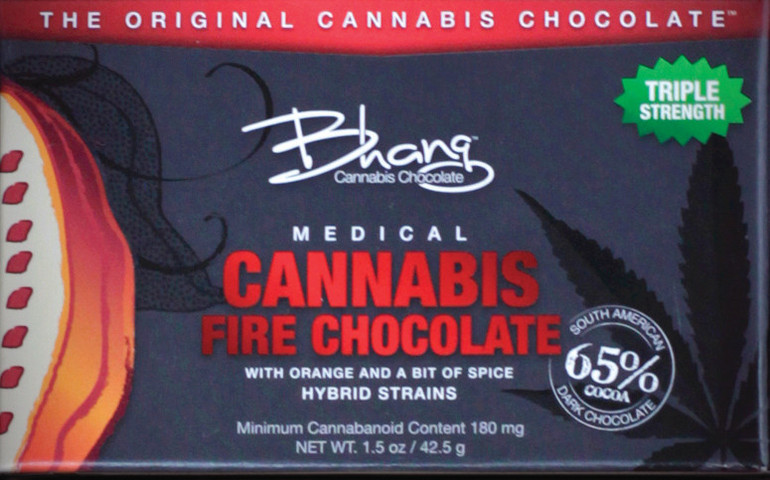DHSS Press Release |
Date: September 24, 2015 DHSS-9-2015 |
| Rita Landgraf, Secretary Jill Fredel, Director of Communications 302-255-9047, Cell 302-357-7498 Email: jill.fredel@state.de.us |
STATE POLICE AND PUBLIC HEALTH WARN OF DANGERS OF UNREGULATED "MEDICAL" MARIJUANA
DOVER (Sept. 24, 2015) - The Delaware State Police (DSP) and the Delaware Division of Public Health (DPH) are partnering to make the public aware of a potentially hidden danger. Twice this month, Delaware troopers have been involved in incidents involving chocolate bars infused with marijuana and labeled as "medical cannabis."
Bhang Medicinal Chocolate bars were seized in one incident. These particular bars are produced and marketed as "medical" marijuana and come in various potencies all the way up to triple strength (180 mg of marijuana). The bars come with a warning on the packaging, "This is a medical Cannabis product. Keep away from children and pets. Consume only under the supervision of your medical provider. If pregnant ask doctor before consuming. May cause drowsiness. Do not operate heavy machinery."
"Public Health is very concerned about people buying so-called 'medical marijuana' from private sources or the Internet, said DPH Director Dr. Karyl Rattay. "Using the term 'medical' never makes something automatically safe, nor do consumers know what they are getting. Not only is it illegal, but it could be laced with dangerous substances or toxins."
Medical marijuana is only legally available to card-carrying participants in the DPH Medical Marijuana Program, which is very tightly regulated. Physicians may authorize a patient to use marijuana to treat symptoms of cancer, multiple sclerosis, HIV and AIDS, Hepatitis C, Lou Gehrig's disease, Alzheimer's disease, or the physical manifestations of post-traumatic stress disorder (PTSD). Conditions that cause severe, debilitating pain, wasting syndrome, intractable nausea and seizures also fall under the state's medical marijuana law. Program participants are issued a state identification card annually, and may only legally purchase the medical marijuana from First State Compassion Center in New Castle County.
Delaware made the decision not to include edible products (meaning food items containing medical marijuana), due to concerns of safety and consistency in the amount of active ingredients. All products sold at First State Compassion Center have been inspected for contaminants, and the use of pesticides on medical marijuana is not permitted in Delaware.
With school back in session and Halloween approaching, the intent of this message is to make the public aware. Parents and teachers are requested to pay particular attention, given the use of chocolate bars, by protecting those not capable of reading the warning label.
No further information on the two cases in Delaware will be released at this time due to ongoing police efforts and privacy concerns. See attached for example of Bhang label:

Delaware Health and Social Services is committed to improving the quality of the lives of Delaware's citizens by promoting health and well-being, fostering self-sufficiency, and protecting vulnerable populations. DPH, a division of DHSS, urges Delawareans to make healthier choices with the 5-2-1 Almost None campaign: eat 5 or more fruits and vegetables each day, have no more than 2 hours of recreational screen time each day (includes TV, computer, gaming), get 1 or more hours of physical activity each day, and drink almost no sugary beverages.
Delaware Health and Social Services is committed to improving the quality of the lives of Delaware's citizens by promoting health and well-being, fostering self-sufficiency, and protecting vulnerable populations.